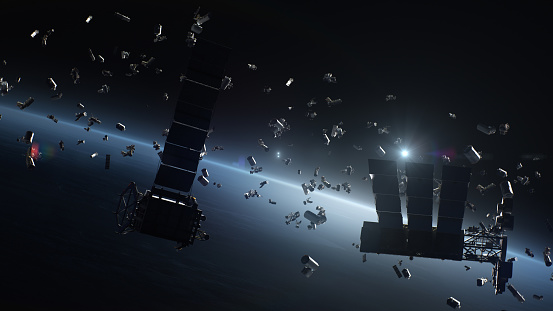
A coalition of space experts is urging governments across the globe and space sector operators to adopt a new set of guidelines that are aimed at tackling the risk of space junk.
The Space Safety Coalition lays out best practices for the sustainability of space operations in light of a burgeoning number of satellites being launched into space. Among the recommendations is a "rules of the road"-style guidebook for maneuvering spacecraft to avoid space junk-generating collisions.
The guidelines were signed by 27 parties, including Inmarsat, a satellite communications company with four decades of experience.
Related: 6 types of objects that could cause space debris apocalypse
"Initiatives like the Space Safety Coalition are an important step towards establishing international best practices and guidelines to protect the space environment, but it is not enough," Inmarsat CEO Rajeev Suri said. "The clock is ticking, and real action is needed."
A 2022 report from Inmarsat and the firm AstroAnalytica suggested that more than 10,000 tons of satellite and rocket objects are currently orbiting Earth. The report added that as humanity's exploration of space grows, this figure could dramatically increase.
Statistical models produced by the European Space Agency (ESA) estimate that there are currently 36,500 objects in Earth orbit more than 4 inches (10 centimeters) in diameter. Additionally, ESA estimated there are a further 130 million objects between 1 millimeter and 1 centimeter wide in orbit around the planet.
In low Earth orbit, these pieces of space junk move at around 17,500 mph (28,200 kph) — about 10 times faster than a bullet fired from a handgun.
The main risk this space junk poses is to satellites in orbit. Collisions can break away pieces of satellites and fracture larger debris pieces, potentially generating even more space junk and thus increasing the risk of further collisions.
Recent events involving the International Space Station (ISS) and debris in space have demonstrated how quickly a dangerous situation could arise for astronauts.
In October 2022, Space.com reported that the ISS was forced to take evasive action to avoid a fragment of space junk created in 2021 when a Russian anti-satellite missile test destroyed one of the country's defunct satellites. Prior to this, in November 2021, ISS astronauts were forced to shelter in a transport spacecraft as the space station was buzzed by space junk.
In addition to the cosmic "highway code," the new guidelines suggest several best practices for space operators that include technical recommendations and operating procedures. These include actively avoiding intentional space object fragmentations such as anti-satellite missile tests and the sharing of information between spacecraft owners and operators, a move that could help avoid future collisions.
The recommendations also encourage the prioritization of sustainable practices during satellite launches, which means the use of reusable launch vehicles and alternative "greener" fuels. There are also provisions within the guidelines aimed at satellite design technology, which encourage the use of propulsion systems that prevent gases from being released into the atmosphere.
These suggestions also propose that future technologies should be more sustainable. This can be done by incorporating aspects like in-space inspections and refueling and improving disposal options for spacecraft coming to the ends of their operational lives.
"National regulators everywhere should now use their powers of granting market access to require that satellite operators adhere to best practices like those outlined by the Space Safety Coalition and beyond," Suri concluded.
Follow us on Twitter @Spacedotcom or Facebook.







